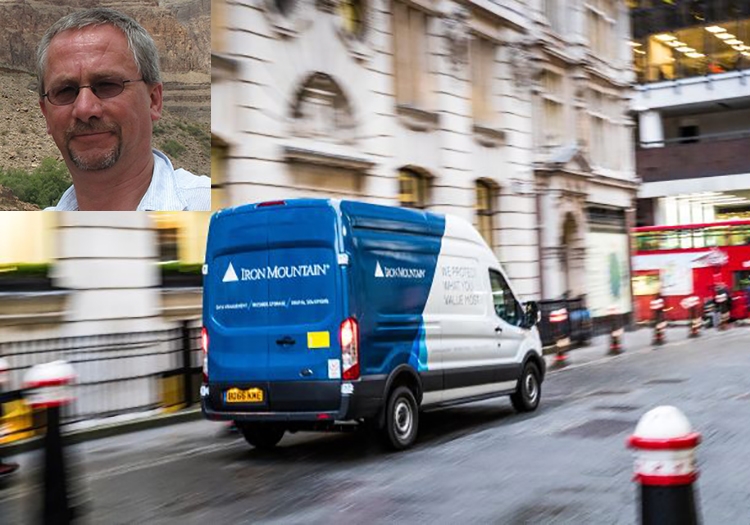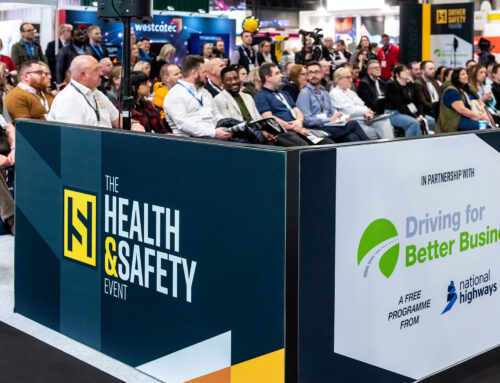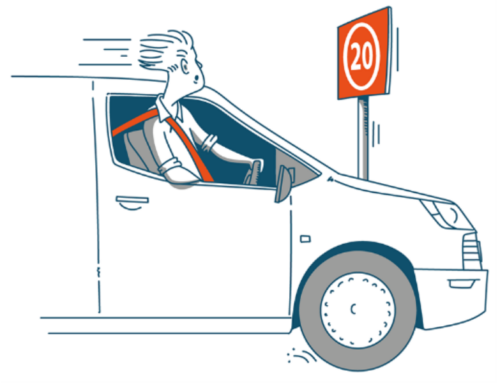A decade or so ago – before the new dawn ushered in by telematics – everything looked very different indeed in the Iron Mountain transport world.
It was almost impossible keeping tabs on the information and business storage firm’s fleet of vehicles – let alone its drivers – and knowing where to apportion blame when things went wrong.
“In the early days some of the vehicles looked as though they’d been in demolition derbies, and there’d be no auditable trail as to how they got into that condition,” recalls Rory Morgan, the firm’s Head of Logistic Support, Western Europe.
“The turning point came when our premiums went through the roof and our insurers said ‘you’ve got to do something different’.”
Today – after the rigorous introduction of robust auditing techniques, carefully structured driver training programmes, a new, frequently updated driver handbook, regular bulletins keeping drivers in touch and the roll-out of state-of-the-art telemetry, it all looks very different indeed for the London-headquartered firm which operates 80 HGVs, 370 light commercial vehicles and a grey fleet of around 200.
Under the management of Morgan and his team, incidents have plunged by 90 per cent over the past nine years. Damage costs are down by 78 per cent, maintenance costs down by 30 per cent, speeding down by 92 per cent, NIPs down by 70 per cent and fuel use is down significantly as well.
The other good news is that Morgan – backed by DfBB – is more than happy to share the secrets of his success with other firms. But what are his hot tips for those hoping to emulate Iron Mountain’s lead?
“I have two mantras underlining all of our actions,” says Morgan. “The first is that if you don’t manage something properly, you might just as well not spend the money on it in the first place. Secondly, if you don’t take the trouble to measure the outcome of an action, you won’t be able to manage it either.”
The other key aspect to be aware of, cautions Morgan, is that it’s vital to keep battling on – long after the first valuable improvements have been made. “Everyone warned us that we’d make the big gains – the easy pickings – early on after we started making changes, and that improvements would then plateau. And that’s just what we experienced,” says Morgan (59).
But Morgan is clear that Iron Mountain’s transport achievements would not have come about without backing from the very top of the firm – and from the drivers themselves.
“It’s critical to get support at a senior level” says Morgan. “With Iron Mountain globally, safety is the number one priority. The term is ‘safety is non-negotiable’.
“That doesn’t mean I have an exhaustive budget but we continually strive to reduce risk. Whether you have one vehicle or 200 or 2,000 the risk will always be there as it just takes one lapse of concentration. But you must do your best.”
Working with drivers – and the vast volume of telematics data they provide – is just as important as getting senior management on-side, says Morgan.
But he says that the drivers have to see a clear advantage to this. “It’s the carrot/reward function, the best driver of the month, best driver of the year, and so on.”
Morgan believes this is so important that he is currently devising a new reward system. It will see drivers with no at-fault incidents and those whose telematics results prove they have been driving carefully, sharing a new bonus scheme.
“My proposal is a 50/50 split between individual and team,” says Morgan. “It means you can’t let the team down; there’s nothing worse than losing your entire bonus because the chap standing next to you has had an at-fault incident or he has not achieved his score.”
So how do Iron Mountain, and Morgan, inspire other firms hoping to emulate their success?
“It needs a systematic approach,” says Morgan, who advises that firms should start by using established industry analyses, such as those espoused by DfBB.
“If I walk into an operation now I want to know all their incidents over the past year. I want some form of trend analysis; where do I need to prioritise to get those quick wins?” says Morgan.
“For instance, is one of the problems reversing in the yard? In 2015 we had 20 incidents where we bumped our own vehicles before we’d even got out the gate. That’s ridiculous; it’s the set-up of the yard. So you ask questions like ‘are their blind spots?’, ‘do we allow people to reverse without a banksman?’, ‘do we have reverse parking?’, ‘do we have segregated areas for cars, for trucks and vans?’, ‘do we have a Le Mans situation rather than a staggered start in the morning?’ You identify problem areas by asking questions – then you prioritise the problems and gradually work through those areas.”
“Road safety is my passion and you’ve got to have that,” says Morgan, who has frequently taken part in conferences organised by road safety charity Brake, and who is a keen DfBB Champion.
“As a result of our DfBB case study that someone spotted, I was with a company yesterday for a few hours after they asked if I could discuss our journey.
“I was only three miles away so I called in for a cup of tea and a chat. I told them there are simple quick wins like working with the drivers, the carrot as opposed to the stick. But regular vehicle checks and defect reporting are important too, just as de-briefing your drivers and looking at their telematics data is vital.
“When the driver comes back into the yard, find out what sort of day have they had, what sort of customer service has been delivered, what the telemetry suggests about fuel, any roadside stops and so on; nothing should slip through that debrief.”
One powerful tool that Morgan has harnessed is GreenRoad telemetry. “GreenRoad say that if drivers score below 20 they are ‘safer’ but we have set it at five, as this increases the risk reduction opportunities immensely,” says Morgan. “Those who make the grade in the first year receive a bronze pin badge, in the second year silver and in the third year gold. They also get a certificate and they get a reward with it too, at the country’s discretion. The UK has had a £50 high street voucher so that drivers can get the weekly groceries or buy something for the summer holidays or whatever it may be.”
Another powerful tool is Iron Mountain’s user-friendly Driver’s Handbook, containing a Code of Conduct, updated every six months. “It’s not overly large which would put people off,” says Morgan. “It’s also important to keep it fresh. We do monthly bulletins too so when the drivers pull over at the side of the road for their break, and they’ve read the handbook, they can read through the monthly bulletin which might be on a subject like ABS, or driving at night, or driving in a low sun.”
Can any firm make the same achievements as Iron Mountain? “Yes”, asserts Morgan, “as long as they have the right mind set. I’ve been in transport all my life but I couldn’t envisage running a transport operation now without having a passion for it. Telematics is a Godsend too – as long as you set out to manage it properly.”
Iron Mountain’s own mind set is clear for all to see. Over the years the firm has taken part in many safety seminars and conferences. It even organised a ‘school safety week’, taking a tractor unit to schools and delivering presentations – backed by goodie bags stuffed with information on road safety. “It was hard work but very gratifying!” says Morgan.
“The way I look at it is this,” says Morgan, who lives in Brecon, and who has spent many years coaching young footballers, in his spare time. “I’ve got two girls at university who both drive cars. If I can contribute that tiny little bit towards making people safer, who knows, it might be one of our own trucks that’s driving down the road when they’re on the road at the same time.
“That’s partly why I’ve done a lot of work with Brake over the years too; road safety is a subject that is very close to my heart.”
Rory Morgan was talking to David Williams, award-winning transport and road-safety journalist, who writes for national publications including the Evening Standard, the Sunday Telegraph and Daily Telegraph.





